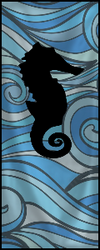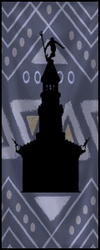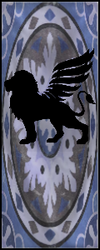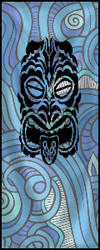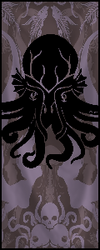More actions
| Fin'ullen | |
|---|---|
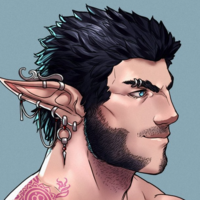 | |
| Race | |
| Pronunciation | Feen-oo-len |
| Classification | Magus |
| Common Nicknames |
|
| Languages | Altalar and in some rare cases Allorn. |
| Racial Traits | |
| Distinctions | Rough, passionate and militaristic nautical Elves. |
| Maximum Age | 500 |
| Height | Average to tall |
| Eye Colors | Any shade of blue or green. Heterochromia is common. |
| Hair Colors | Always black, though shades such as Raven Black or Midnight Black is possible. |
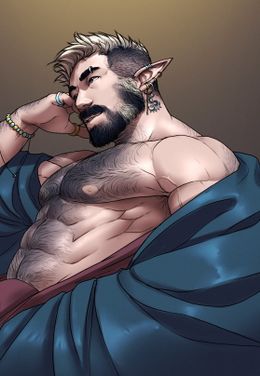
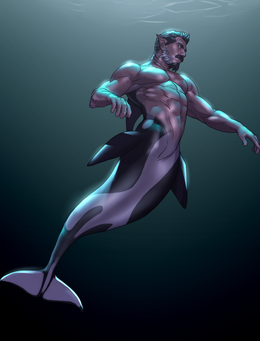
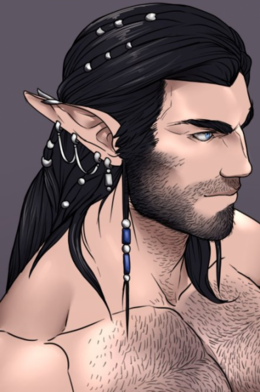
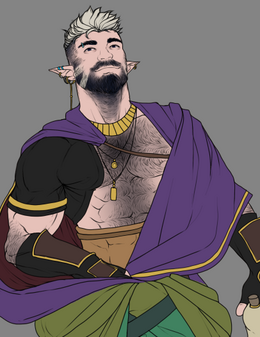
Fin’ullen history is some of the oldest in the world, being part of the greater Allorn Empire until its fall, and having played a role in every major historical event of the past millennia. As the Allorn Empire fell, the Fin’ullen have for the first time journeyed on their own accord, no longer confined by Teledden or Suvial Princes. The Fin’ullen quickly captured the niche of the Elven sailor and marine, commanding a fierce reputation on the oceans, rivaled only by their combat ferocity and passionate personalities. While the exact origin of the Fin’ullen is lost to time, their unique identity has started forming a legacy of its own, no longer defined by the Est’Allorn, or the Empire of old. Fin’ullen Princedoms continue to exist to this day, and the Fin’ullen are some of the most seen Nelfin outside of the recreated Allorn Empire, having large Regalia-loyal populations in the Regalian Archipelago and in the wider world beyond.
Core Identity
To be a Fin’ullen is, at its core, to be rowdy and independent, to be martial and disciplined, but also to throw a riot when things don’t go one’s way, and to take a great deal of Nelfin pride in one’s work, especially when it concerns anything to with the ocean. Fin’ullen love water of any kind, and can never stay separated from the ocean for too long, becoming uncomfortable far inland. The Fin’ullen are mundane-leaning, preferring weapons over Magic and close-quarters melee combat. The Fin’ullen are passionate and expressive, to the point where they are often misunderstood to be hot headed and stand-offish, with plenty of outbursts. Fin’ullen spend a lifetime honing their craft, especially when it concerns the military, and are very keen to show off to anyone who will watch. They are often described as ‘both immensely Est’Allorn in nature, and yet the least Nelfin in behavior’, referring to the fact that Fin’ullen have such an emotive and bold nature that they often feel out place among the more emotionally repressed Nelfin Races.
Love of the Sea
A Fin’ullen must never be too far away from the ocean, or they become melancholic. The ocean represents the wide vast unknown to them, the bottomless deep which hides the many secrets of the world, but also the vehicle upon which their wind-cutters slide through the waves, bringing them to far away places. The ocean has a special place in every Fin’ullen heart, with ocean motifs frequently seen on their clothes, and water-colored or inspired elements being present in their presentation and daily lives. It is even said that the Fin’ullen fight with the elegance of flowing water, especially their spear techniques, inspired by leaps taken on and off ship decks.
Morrlond’s Cult
The Fin’ullen are unique in that they incorporate Greater Demons into their culture and religion, something that is unthinkable to most other Estel worshipers. The Fin’ullen see Demons as an eternal entity present in the world, and one that is worthy of respect, even if it must be fought and staved off. The Fin’ullen have drawn lessons of restraint from the common Est’Allorn history, but also praise Greater Demons for their ferocity and destructive power. They acknowledge Morrlond, the Greater Demon of the deep as the King of Demons (they do not acknowledge Void Gods or Arken), and even worship Morrlond as a form of appeasement, though many aspects of Morrlond’s appearance are frequently seen in Fin’ullen symbolism. Fish scales, fins, bioluminescent body parts and webbed structures are common, to the point that Fin’ullen ships for example appear like sails are fins and the hull is made of interlocked fish-scale plates.
Martial Command
To the Fin’ullen, it is unthinkable not to have some kind of military training or skill. Indeed, the very value of a Fin’ullen, especially among fellow Fin’ullen, is to be measured by their martial skill. From a young age, Fin’ullen are encouraged to worship the concept of the military and especially the navy, while seeing great military heroes and ancestors as examples to live by. Even the most common of Fin’ullen who works as a craftsman or laborer has spent half an Ailor lifespan, training with some type of weapon, while martial specialists train their whole lifetime, centuries’ worth of military knowledge stored in their mind. It should come as no surprise that the Regalian Navy takes many lessons from Fin’ullen naval tactics and marine deployments, and that the majority of the military books available in most libraries were written by Fin’ullen authors, or at least dictated to Lesarra writers by Fin’ullen who might not have the patience to sit and write pages upon pages of information, and would much rather venture out into the world for another fight or journey.
Design
Mental Characteristics
The Fin’ullen are vain, hot-headed, passionate, outspoken, vexatious and challenging. Even simple things like discussions become contests of wit and skill to them, and one can quickly enrage a Fin’ullen to a fight by mocking their combat skill. This does not necessarily mean that all Fin’ullen are assholes by nature. In fact, the Fin’ullen are sometimes also described as the most tolerant and open-minded of Nelfin, who are willing to at the very least treat other Races as roughly equal to them (while still acknowledging their own superior military skill). Still, while a Teledden might always deprive a person of the catharsis of respect, Fin’ullen will at least afford those who are deserving in their eyes the homage that is owed (though it is difficult to earn). Fin’ullen also have an unrestrained temper and are very passionate and direct about what they want. So much so that they revel in public displays of affection, and are very open and brash about their carnal inclinations with others. Fin’ullen as such have difficulty restraining their own cravings, leading to the saying “what happens on the oceans, stays on the oceans”. This is not to say that the Fin’ullen rampantly cheat (though it does happen with frequency), rather it just means that they have come to accept that they think less about the consequences of their actions while sailing across the water with the wind in their hair, when there’s no one to remind them about obligations or self-restraint.
Physical Characteristics
The Fin’ullen are physically similar to the Avanthar and Ailor. They are much stockier and bulkier than the other Nelfin Races, and are physically much better suited for physical labor. The Fin’ullen are physically much more masculine than one would expect of a Nelfin Race, with both sexes having broader shoulders and a larger musculature in general, with square face structure. They still have high Nelfin cheekbones and pointy Nelfin ears and strong eyebrows, but their individual qualities are much more rough and pronounced instead of elegant and graceful. Fin’ullen men in particular are excellent at growing a beard, and often have plenty of body hair. The Fin’ullen exclusively have black hair (though there are some slight tone/shade differences between midnight black and raven black hair for example). Their irises also exclusively have green or blue color tones. Fin’ullen exclusively have a light pink skin tone, though can also have epicanthic eye folds. One might expect that the muscularity of the Fin’ullen is innate to their physiology, however this is not true, merely a by-product of their physically active and military lifestyles.
Fin’ullen in Regalia
Fin’ullen are a highly integrated Race in Regalia, with a widespread population across the Archipelago, though often only found in coastal regions. In the west are the regions of Mavaal Assaleïa and Mavaal Eïsella, which have majority Fin’ullen populations, including Nobility. Major cities from which many Fin’ullen migrate to Regalia are Tol Visëu, City of the Hundred Docks, Tol Iche, the City of Chains whose rivalry with nearby islands caused them to raise massive metal chains across the straits, Tal Nassäle which is the largest Fin’ullen city east of the Allorn Empire, and Tol Cee, City of the Seventy Bridges. Fin’ullen exist in all of Regalia’s social circles, but notably in the Imperial Navy and the Board of Admirals. Even migrants from the Allorn Empire’s many Fin’ullen principalities like Talant Ilha Faial are welcomed with open arms, and Fin’ullen quickly integrate into Regalia.
Racial Abilities & Specials
Racial Abilities are generally a set of unique powers and effects that all peoples of that Race all innately have, while Specials are more passive, aesthetic focused capabilities. Specials are defined per-page, while Abilities can be searched on the Ability List page to determine their generic function. Fin’ullen have a mix of Abilities and Specials themed around Water, Mutations, and the Ocean. Half Fin’ullen also get access to the Racial Abilities, but do not have access to the Specials, except for Waterborne, Ageless, and Call of the Deep.
Abilities
| Ability Name | Ability Type | Ability Range | Ability Description | Modifiers |
|---|---|---|---|---|
| Knockdown Immune | Constant Passive | Self | Grants the user Knockdown Immune | N/A |
| Empowerment | Buff Power | Self | Grants the user Empowerment | Fin'ullen Modifier |
| Weapon Summon | Summon Power | Self | Grants the user Weapon Summon | Fin'ullen Modifier |
| Waterborne | Constant Passive | Self | Grants the user Waterborne | N/A |
Specials
- Ageless: The Fin'ullen are Ageless, when they become adults, they cease to visually age. Additionally, they can change their age-based appearance to any Ailor age equivalent they want (so long as it is 18+).
- Arcane Mastery: The Fin'ullen can use telekinesis to automate non-combat domestic functions like opening windows and doors and levitating cutlery or retrieving items from a distance and levitating them to their hands.
- Elder Voice: The Fin'ullen can invade the minds of others and project their voice into it by looking at them, causing their eyes to glow. This is experienced as unpleasant, like yelling in their mind.
- Waterborne: The Fin'ullen can breathe and see perfectly underwater. They can also swim as quickly as Aquatic Allar, and can form aquatic mutations in and out of water, including but not limited to a mermaid/man look.
- Waterform: The Fin'ullen can control water through the air with their hands and move water around remotely. Additionally, they can apply water aesthetics to any Abilities without the Magic Point Buy.
- Seaform: Any summoned weapons or armor Fin'ullen have can be used with aesthetics of coral, water, or raw Magic. They can also use coral aesthetics on Abilities, and speak normally underwater.
- Watercrest: The Fin'ullen can cause their hair to appear like flowing water, either blue-tinted and lightly glowing, or black water, like their natural black hair color. This water dissipates at the tips of their hair.
- Bubbleform: The Fin'ullen may apply bubbles or sea-foam as an aesthetic to any Abilities. Additionally, they can cleanse any dirt, grime, or blood from clothes or skin (even on others) with the wave of a hand.
Culture
|
Ailor Cultures | ||
|---|---|---|
|
The People of Faiaal are the most common Fin'ullen found, sharing a cultural bond with the Allorn Empire and all the other Nelfin species that exist within its hemisphere. This is a good option for players who aren't overly invested in cultural expressions or social customs, and just want to jump straight into playing a nautical Elf without too much hassle. The People of Faiaal mostly hail from Ilha Faiaal, a nominally independent Fin'ullen state with a powerful navy, or from the Fin'ullen provinces in the Regalian Archipelago. | ||
| ||
|
The Sàllir are somewhat of an oddity in the wider Nelfin cultures, in that they are the only Nelfin culture that has reconciled with the Asha. The Sàllir are a mixed Fin'ullen Asha culture that don't have any land to claim as their own, but roam the high seas between Faiaal and Sendrass, building floating cities and more notably their mysterious Arc-Monoliths, massive towers that signal lights in the misty seas, with secrets the Sàllir hold close to themselves. The Sàllir culture is based on ancient/classical Nubian culture. | ||
| ||
|
The Cërsio (sometimes also called Olmaan) are a peace-loving and commerce-driven Fin'ullen culture hailing from the small nation of the Olmaan Nelfin Republic, the only known Nelfin state in existence that does not have a King, Queen, or some kind of autocratic system, and instead maintains a form of pseudo democracy through a voting system among its patrician families. The Cërsio have done away with much of the military bravado that other Fin'ullen might possess, instead focusing their naval activities on trade and sampling wares of faraway lands. The Cërsio culture is based on medieval Venetian culture. | ||
| ||
|
The Kaimoana are a very rare sight in the world, as they mostly stay clear of the wider Allorn world, and have very few reasons to go to Regalia unless they are forced to. The Kaimoana are what the other Allorn would deride as "tribal Elves", Fin'ullen who have largely abandoned urban living and favored island-hopping through a fleet of sleek and fast ships to establish smaller culturally vibrant communities that largely reject the fast living and complexities of the wider world. The Kaimoana culture is based on real world Maori culture. | ||
| ||
|
The Daphalar are an almost entirely aquatic living culture of Fin'ullen who have rejected living on land, and entirely or partially resorted to living underwater, using their native aquatic abilities and specials to thrive in the water. The Daphalar have mostly done this to be closer to Morrlond, which is also why they are generally considered Morrlond's most favored worshipers, though Morrlond lives deeper with his Nautalar (which are unplayable). The Daphalar aren't based on any real world culture, and rather just have a general aquatic horror aesthetic to them. | ||
| ||
Language
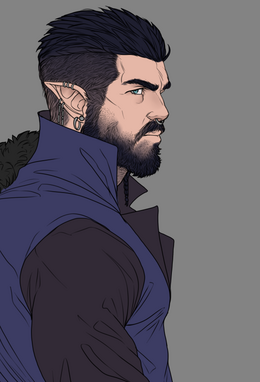
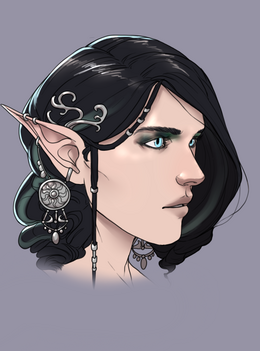
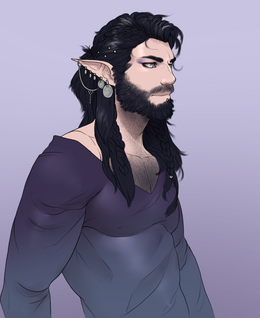
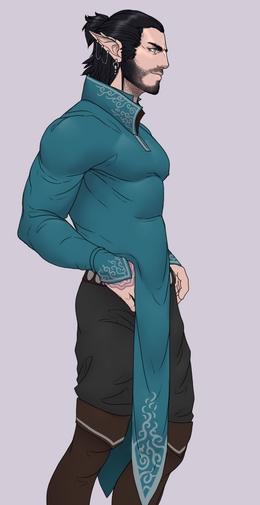
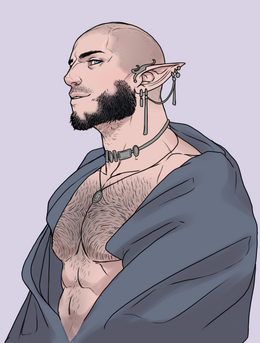
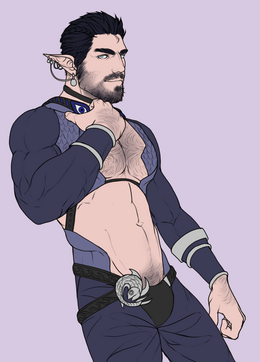
The Fin’ullen language is shared with the Teledden, Lesarra, Solvaan and Minoor (not the Suvial, who do have their own language), just called Altalar. Altalar is a modernized version of the Allorn Language that the Fin’ullen once spoke too, but that language is essentially dead in the modern era save for some dialects that still survive in enclaves. While Ailor call the Fin’ullen language just Altalar, its actual name is Ïsursa’ïos, or translated to ‘The God-Written Tongue’. The Altalar language is a fantasy language that has no real-life equivalent, and is specifically also not Tolkien Elven. It is graceful and melodic, sing-song without hard or unpleasant sounds. Fin’ullen naming principles are the same as the other Nelfin Races and to an extent even the Kathar. It starts with a first name, followed by a middle name, family name, social distinction, and finally heritage. Fin’ullen names do sound slightly different than other Nelfin Race names however, even if they use the same language.
A list of Fin’ullen male coded names: Solnuc, Tirioc, Golac, Halrenac, Hazrec, Kaeroc, Acrac, Sinnehac, Finelor, Tannor, Torfior, Tithror, Kiros, Caabas, Selthas, Eclurtas, Generally speaking all male names end in uc, ac, oc, or, ar, as, or as.
A list of Fin’ullen female coded names: Sielgata, Elfiana, Khedge, Dellene, Aghena, Ottisa, Loffaïa, Earessi, Solli, Faëffi, Talala, Ninreni, Zilara, Zara. Generally speaking all female names end in e, a or i.
Fin’ullen middle names are usually references to some sort of Ocean term, famous ancestors, important events, or past Allorn Empresses. Last names frequently include duplicate vowels and very little accents. Examples are: Mionther, Caravaal, Hannoor, Didiin, Shabaal, Farythuur, Vaalrioc, Avhaalor, Sodheen, Thortaal, Tiranoor, Vyadaal etc. Social names are quite simple, if a Fin’ullen is common it becomes “Bel-Saal”, if they are wealthy or aristocratic, it becomes “Bel-Ant”, and if they are noble it becomes “Bel-Sol”. Finally, the heritage name refers to the city they were born, or the region their family is from. This is always preceded with the prefix “Alloren” if they come from the Allorn Empire, or “Solleria” if they come from the Regalian Empire, with the heritage name itself simply being a place name or region name. An example of a full Fin’ullen name would as such be: Golac Mensëvaal Hanoor Bel-Ant Solleria-Tol Visëu. For sake of simplicity in Regalia however, this would just be shortened to Golac Hanoor.
Religion
The vast majority of the Fin'ullen worship Estellon, however a sizeable minority of the population are Void Worshippers, despite Morrlond being an Estellon entity, they still worship the overarching Void and disregard the idea that Morrlond was made an Exist entity by Estel. There are some Fin'ullen yet who are atheist or agnostic, particularly because the role of Fin'ullen in the bigger picture of the Allorn legacy has degraded to the point that they mostly exist as a standalone society detached from all others. Regardless, in any and all circumstances, Morrlond is still an entity observed by all Fin'ullen, even those who do not believe in Estellon or Void Worship, as an important cultural figure.
Families
Childhood
To be a Fin’ullen child is to be encouraged to see every activity as a competition. Children have their heights measured by a spear in the household: even growing is competitive. From an early age, children play with fake weapons, and are spoon-fed stories about glorious sea battles and ancestors as well as heroes of old. Fin’ullen childhood is as such a very imaginative, but also very physically demanding childhood, with training regimens starting early, and children often being fully capable soldiers by the time they become adults. While the concept of a child soldier is taboo among the Fin’ullen, parents have no reservations indoctrinating their children into a martial lifestyle, where it is even common for the parents to demand military honorifics when being addressed by their children. Despite such a rigorous household, Fin’ullen parents are known to have great adoration for their children, and it is hard to find a single Fin’ullen who would abandon their child.
Adulthood
In contrast to their childhood, Fin’ullen Adulthood is wild and reckless. No longer constrained by their disciplining parents, Fin’ullen often go through a sabbatical of sorts where they travel far and wide to discover themselves. Most Fin’ullen complete this and become sailors or warriors or laborers, though some reject this lifestyle and become more rebellious in nature, seeking other employment. Fin’ullen Adulthood, particularly the first 100 years of Nelfin aging, is spent making a whole lot of mistakes from which the Fin’ullen hopefully learns, as they impulsively go from one activity or focus to another. Fin’ullen usually level out and become more tame and reserved by their second century, but anything that flares the passions gets them right back to being rowdy and loud.
Romance & Gender Norms
Fin’ullen romance is very care-free and casual. They are frequently compared to the Kathar, but this is an unkind comparison because the Fin’ullen are decent and communicative. In fact, their communication is so crystal clear that a Fin’ullen might simply propose intimacy in the middle of a casual conversation, something that takes other Cultures out of left field. To many Fin’ullen, romance and intimacy is seen more as a physical activity than a means through which to express fondness or love, and as such, Fin’ullen can be called “one-night stand Elves” by Ailor, though this underestimates the attention to detail and dedication a Fin’ullen might show a lover, even if temporary. Fin’ullen Gender Norms are simple: they acknowledge the male and female gender, and the non-binary, though because all Fin’ullen are relatively masculine, there are very few among them, having to resort to Alchemy or magic to overcome physiology. Fin’ullen do not see anything out of the ordinary with different sexualities or sex/gender identities.
Fashion
The majority of the Fin’ullen wear a Loëlevaal, which is a tight-fitting cotton sweater with an open collar, and a large fabric flap that extends down to the knees at the front. This fabric flap usually has a decoration on it telling of the identity of the wearer, for example military embroidery marking their rank or their family’s identity. Their wrist openings have gold thread decor as well, as do their shirt collars, but the rest of the fabric is left as clean and unimpeded as possible, with just a simple pair of pants and riding boots underneath. Fin’ullen dress simply, but also for bodily expression, especially because the Fin’ullen love putting their physical fitness on display. Another style of dress is the Matoor, which is like a vest except it has no fabric on the chest piece, covering only the arms, or even just a single arm. The habit of Fin’ullen to walk around bare-chested is generally looked down upon by other Nelfin cultures (and to an extent, also most Ailor cultures) though the Fin’ullen are indifferent to this. A common retort the Fin’ullen use when being criticized for immodesty, is to say “Üa Mirrin?”, which is a vulgar Altalar saying translating to ‘are you admiring me?’, emphasizing how they see the criticism as envy or flattery. Commonly worn by Fin’ullen for accessories are waist sashes that also act as tabards from the waist down, as well as a great deal of Silver jewelry. Long ear bangles are common (even for men), and Fin’ullen hair is often peppered with silver beads and rings grouping strands of hair together, or weaving them into braids. Most Fin’ullen wear their hair long, even the men, but short-haired Fin’ullen can also be found, especially around the military where long hair can be seen as a disadvantage.
World View
World View is optional content that helps give Fin’ullen flavor and depth. These also apply to the standard Faiaal Fin'ullen Culture, not the others.
- Fin’ullen are usually ambivalent about the Allorn Empire’s return. While at face value, many Fin’ullen are in favor of a return to glory and the days of Fin’ullen hero captains, many of them would also detest losing their new-found independence. More-so than the Teledden, Suvial, and Lesarra (Solvaan don’t count since they already lived abroad), did the Fin’ullen learn to appreciate being around foreigners. They would be loath to return to being mere swords for the Teledden.
- Fin’ullen in Regalia are commonly pro-Emperor and usually progressive. While there isn’t a great Occult rights movement among them (due to their nature to generally shy away from Magic), the Fin’ullen are fond of House Kade and Regal Culture. This is because House Kade almost exclusively has black hair and blue eyes, just like the Fin’ullen, and because Regal fashion suits the Fin’ullen so well.
- There is a sizable population of Fin’ullen Unionists in Regalia because many families decided to throw their lot in with Regalia and earned their place with successive Emperors, paying homage to them. They are not as numerous as the Solvaan, but still also observe Morrlond and his Demon agents, not as a form of worship, but as a form of appeasement because they believe them to be very real.
- The Fin’ullen and Solvaan have a fairly complicated relationship because both of them are very martial inspired people, they just have different approaches to it. At the end of the day however, a Fin’ullen can respect what a Solvaan can do in the mountains, and a Solvaan can respect what a Fin’ullen can do on the oceans, and they try to not clash too often when it comes to a contest of martial skill.
- Despite the role of Eronidas in the destruction of the Allorn Empire and the slaughter of many Fin’ullen armies by their hands, the Fin’ullen and Eronidas get along excellently in modern times, even while the other Nelfin look on in disgust. Eronidas and Fin’ullen have found a mutual appreciation for each other in their martial education, as well as their fellow love for bathing and bath houses.
- Because of the ocean-based thematics, a lot of the clothing Fin’ullen wear (and a lot of their symbolism) is made in all kinds of shades of blue. Sometimes wearing colors other than blue is seen as risky by the Fin’ullen, while they have a distinct distaste for the color red, believing it to be the antithesis of the ocean.
- Fin’ullen are materialistic by nature and live the concept of “therapy-shopping”. A Fin’ullen who is down on their luck or upset will quickly go out attempting to acquire new things. They also love collecting clothing and accessories, and frequently changing them out.
- Fin’ullen love a chase, and particularly a hunt, but never a hunt to kill. While Urlan take trophies from their hunted kill, Fin’ullen only chase to capture, and then prove they were able to overpower, before releasing the animal again.
- Fin’ullen take fine art statues of people to new heights, with buildings often having wide galleries of huge statues of soldiers or guards. Due to contact with the Eronidas and some cultural exchange, the Fin’ullen have started depicting Nelfin in traditionally Eronidas armor with Bronze breastplates shaped like a male torso, which they consider a sign of strength.
- Fin’ullen may occasionally spend their free time collecting pearls and other beads or rocks from the ocean before polishing them and weaving them into art or jewelry. Ocean Catchers are woven sheets of glass beads and string, which also incorporate all manner of shells, and is usually left hanging in windows to invoke the spirit of the ocean.
- Fin’ullen cities are always built with an internal network of waterways. In fact, many of the cities almost exclusively inhabited by the Fin’ullen don’t even have any roads, with houses immediately stepping out into waterways, much to the chagrin of other Nelfin who have to live there.
- Finullen have a traditional custom of trial by combat called Morrlond’s Will. This duel, unlike the style of other cultures however, takes place entirely underwater, and is not to death, but rather until first blood-drawing, as blood is easier to spot underwater when it mixes with the liquid around it.
- When Fin’ullen want to let go of things, they toss them into the ocean to Morrlond’s embrace. The same applies to the deceased, who are always buried with casket at sea, a tradition that sets the Fin’ullen apart from the more common crypt interment that is common among the other Nelfin.
- Fin’ullen frequently do keep pets, unlike Teledden. However, Fin’ullen pets must always have white feathers or fur. A very common animal that is chosen is the Samaan Gull, a sea bird that is native to the Fin’ullen Principalities in the Allorn Empire and is imported with great care to Regalia. Despite them being sea-birds, they can be safely kept inside a house and will happily sit on a perch for hours quietly.
- Fin'ullen are in fact capable of keeping a ship moving even without any wind of propulsion, merely by using their Waterbending. If enough sailors attempt to move the water around them forwards, the ship will move forward and gain momentum. This technique was often used during the Allorn Empire days to keep ships moving in an emergency, or to rapidly reposition a ship that was outmaneuvered. This is also why Fin'ullen ships can never capsize fully, as Fin'ullen sailors would simply prevent the water from flushing into the ship, and allowing it to continue the roll until it was upright again.
- Every Fin’ullen home has a large lavish bath in it. Without exception. If the Fin’ullen is a noble, they will have even more baths and pools.
Trivia
- The name Fin’ullen is an Allorn language term that roughly translates to “Those who ride to battle on the backs of sharks or killer whales”. There are some Fin’ullen who ride on the backs of giant sea creatures in this tradition, but the habit has mostly been obsoleted by the advent of warships.
- While Fin’ullen could in theory use their Waterbender skills to drown a person in their own cup of water, it is a great cultural evil and no Fin’ullen would ever do this (plus it’s also really hard to balance such an ability, but this is just a cool lore tidbit).
- Just like Suvial, Lesarra, Solvaan and Teledden, you want to play a Fin’ullen, because Nelfin win a lot, especially the Nelfin that were once the founding members and core of the Allorn Empire.
| ||||||||||||||||||||||
| Accreditation | |||||||||
|---|---|---|---|---|---|---|---|---|---|
|
| ||||||||
